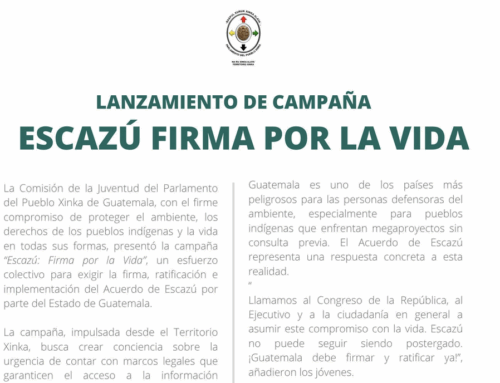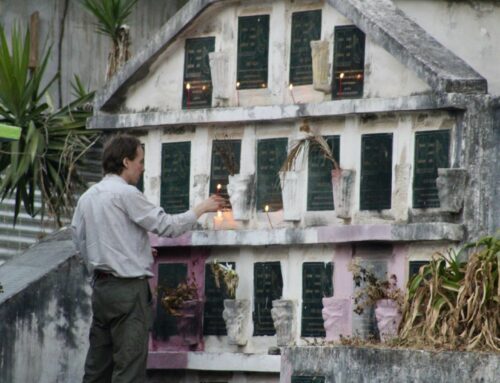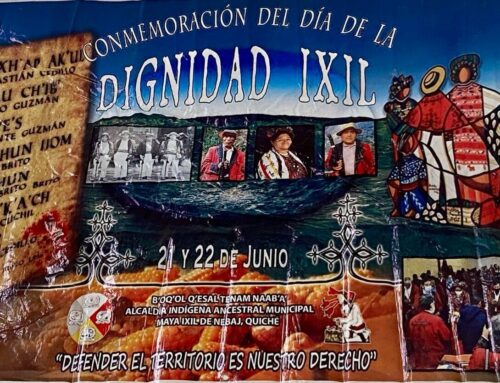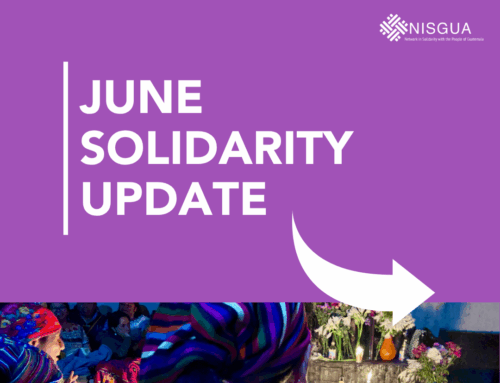NISGUA’s Fall Speaking Tour Kicks Off in November
|
|
NISGUA's fall speaking tour starts on November 3rd! “How to Stop a Dam with Indigenous Resistance" will visit Washington, Colorado, New Mexico, and Arizona to lift up lessons from successful organizing in the Ixcán, Cobán, and Uspantán regions, where Indigenous communities have successfully halted the construction of a mega-dam for over a decade. Here are a few ways you can participate and learn more:
- Follow the tour virtually - RSVP to the Facebook event to receive regular updates throughout the tour.
- Find an event near you - See the full itinerary of public events and invite your community.
- Get to know the speaker - Read our recent interview in English and Spanish with José Gómez, Maya Mam activist and coordinator of the Association of Communities for Development and the Defense of Land and Natural Resources (ACODET). Together, we discussed the importance of indigenous organizing, grassroots exchange, and community consultations.
- Get to know the organizers - Read our recent profile on this year's core organizers. Speaking tours are made possible by a network of activists and volunteers committed to building international links between movements in their communities.
|
|
Learning from Survivors: AJR President, Edwin Canil, speaks on the fight for justice for genocide
A month ago, a Guatemalan court unanimously confirmed, yet again, that Sí Hubo Genocidio - Yes, it was genocide committed by the Guatemalan military against the Ixil people. In the same ruling, the court failed to convict former Head of Military Intelligence Rodriguéz Sánchez, or anyone else, of these crimes. In the wake of this decision, NISGUA held a webinar, "Learning from Survivors," with Edwin Canil, president of the Association for Justice and Reconciliation (AJR), the lead plaintiff organization in the case.
Edwin spoke of survivors' long struggle to break the silence about genocide. He noted that the recent sentence is an important step for Indigenous peoples as they work towards structural changes in Guatemala. Survivor-led struggles for justice also created space for all Guatemalans to stand up against impunity and corruption, saying that "the struggle for justice struck the first blow...to see if the system could handle standing up to deeply embedded [economic and military] power structures." He highlighted that the global work for justice is strengthened by international relationships and that it is our collective responsibility to denounce crimes like those committed during the conflict. You can find a recording of the event on our website.
NISGUA has accompanied the AJR since its inception in 2000.
|
|

|
|
An Ixil genocide survivor looks on during a commemoration ceremony held prior to last month's genocide sentence.
|
|
This October, we welcomed our 2018 GAP cohort! We are excited that Olivia, Tal, Meredith, and Rosemary (pictured here, with GAP Coordinator, Martha) have joined us in Guatemala. To hear about accompaniers' reflections on their experiences, check out our "Accompanier Perspectives" blog series. Or apply to be part of next year's cohort!
|
|
|
500 Years Screening: Life in Resistance from Guatemala to Minnesota
On October 2, over 70 people gathered in the American Indian Community Housing Organization in Duluth, MN to watch Skylight Pictures' 500 Years and learn from local indigenous leaders. Former accompanier and NISGUA fellow, Claire Bransky, organized the event, which educated participants about indigenous resistance from Guatemala to Minnesota.
After viewing the documentary, founder of Native Lives Matter Rene Ann Goodrich spoke about the national crisis of Missing and Murdered Indigenous Women, reminding the crowd of our collective responsibility to defend women’s bodies and Mother Earth. Lyz Jaakola also spoke about the resistance against Enbridge’s Line 3 Pipeline, which is threatening Anishinaabe land and treaty rights in northern Minnesota. Jaakola shared a song with the audience, and reminded everyone that singing and sharing are acts of resistance for indigenous women. Finally, Deb Topping of Honor the Earth talked about the threat to food sovereignty that Line 3 represents for the Anishinaabe people, in clear violation of treaty rights. “You can’t eat oil, what part of that don’t you understand?” Topping said.
After the speeches and an update on the current events in Guatemala, local anti-racist and land defense organizations tabled, mobilizing participants for local actions and movements. Learn more about how to host your own screening of the film here.
|
|
|
Rene Ann Goodrich, founder of Native Lives Matter in Duluth, is an Ojibwe elder, grandmother, educator, teacher, and advocate. She spoke about protecting the water and the struggle to bring an end to the crisis of Missing and Murdered Indigenous Women.
Photo: Aaron Bransky
|
|
|
Violent attacks against Peaceful Resistance of Ixquisis
On October 12, two members of the Peaceful Resistance of Ixquisis were shot and injured in separate events. The attacks occurred on the same day as a series of other violent incidents committed by unknown perpetrators. Just three days earlier, Peaceful Resistance members reported an attack by National Civil Police (PNC) Agents. While en route to a protest camp in Ixquisis, the group was intercepted by heavily armed police who fired tear gas at them. At least 6 people incurred injuries from the tear gas inhalation and canister impact.
The Peaceful Resistance established the protest camp on September 11 to protest the construction of three hydroelectric dams, property of Energía y Renovación, and ongoing repression from state and private security forces. The Peaceful Resistance has reported intimidation, threats, and acts of violence from the PNC, the army, and the company's private security in the last several years, including the still unsolved murder of Sebastian Alonso Juan on January 17, 2017.
The attacks and criminalization attempts come on the heels of a series of legal and administrative actions taken by the Peaceful Resistance against the hydroelectric dam projects. In June, the Resistance and their allies presented arguments before the Guatemalan Supreme Court calling for the suspension of the Pojom II dam due to irregularities in the licensing process, an inadequate environmental impact assessment, and the violation of the Maya Q’anjob’al and Chuj communities' right to consultation. In August, the Peaceful Resistance presented a formal complaint against the Pojom II and San Andrés dams at the Inter-American Development Bank, one of the hydroelectric project’s major funders.
NISGUA has accompanied communities standing in opposition to Energía y Renovación’s hydroelectric projects since 2016.
|
|
|
This October, the trial began against former Kaibil, Santos López Alonso for his role in the 1982 Dos Erres massacre. López Alonso is accused of the murder of 199 community members, crimes against humanity, and falsifying documents to take Ramiro Osorio Cristales (pictured testifying) from the community and force him to work for López Alonso's family.
Photo: VerdadJusticia
|
|
|
Check out the 2019 calendar celebrating People Power!
This year's calendar lifts up the myriad forms of community self-determination across Guatemala: it celebrates Guatemalans as they reclaim their rights, deliberate on decisions, safeguard food sovereignty, affirm their identities, organize resistances, honor nature, forge memory, create ceremony, and celebrate life.
Join us in celebrating People Power throughout 2019 -- buy your calendar today!. Sales directly support NISGUA's program work, building mutually beneficial ties between the people of the U.S. and Guatemala to strengthen the global movement for justice.
|
|
|
|













Leave A Comment